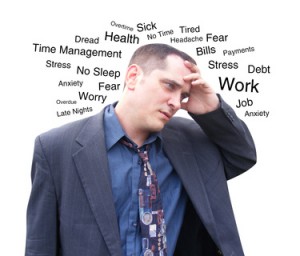stress symptoms Causes & Relief
December 31, 2012 by Jordan Morgan
Filed under Employment, Family and Personal
Stress symptoms
Stress affects us all. You may notice Stress symptoms when disciplining your kids, during busy times at work, when managing your finances or when coping with a challenging relationship. Stress is everywhere. While a little stress is OK — some stress is actually beneficial — too much stress can wear you down and make you sick, both mentally and physically.
The first step to controlling stress is to know the Stress symptoms, but recognising stress symptoms may be harder than you think. Most of us are so used to being stressed, we often don’t know we are stressed until we are at the breaking point.
Signs of stress in individuals
If you are suffering from some of the following Stress symptoms it may indicate that you are feeling the Stress symptoms. If you find that work or aspects of your work bring on or make these symptoms worse, speak to your line manager, trade union representative or your HR department. It may be that some action taken at an early stage will ease the stress and reduce or stop the symptoms.
Emotional symptoms
- Negative or depressive feeling
- Disappointment with yourself
- Increased emotional reactions – more tearful or sensitive or aggressive
- Loneliness, withdrawn
- Loss of motivation commitment and confidence
- Mood swings (not behavioural)
Mental
- Confusion, indecision
- Can’t concentrate
- Poor memory
It is important to learn how Stress symptoms you because it will help you figure out what coping techniques work best for you. It will also enable you to avoid resorting to unhealthy habits, such as smoking, drinking and comfort-eating.
You should make an appointment to see your GP if you’re experiencing any of the above symptoms, and self-help techniques aren’t working for you. They may suggest other coping techniques for you to try or recommend some form of counselling.
Things that influence your stress tolerance level
- Your support network – A strong network of supportive friends and family members is an enormous buffer against life’s stressors. On the flip side, the more lonely and isolated you are, the greater your vulnerability to stress.
- Your sense of control – If you have confidence in yourself and your ability to influence events and persevere through challenges, it’s easier to take stress in stride. People who are vulnerable to stress tend to feel like things are out of their control.
- Your attitude and outlook – Stress-hardy people have an optimistic attitude. They tend to embrace challenges, have a strong sense of humour, accept that change is a part of life, and believe in a higher power or purpose.
- Your ability to deal with your emotions – You’re extremely vulnerable to stress if you don’t know how to calm and soothe yourself when you’re feeling sad, angry, or afraid. The ability to bring your emotions into balance helps you bounce back from adversity.
- Your knowledge and preparation – The more you know about a stressful situation, including how long it will last and what to expect, the easier it is to cope. For example, if you go into surgery with a realistic picture of what to expect post-op, a painful recovery will be less traumatic than if you were expecting to bounce back immediately.
For full story Click Here


